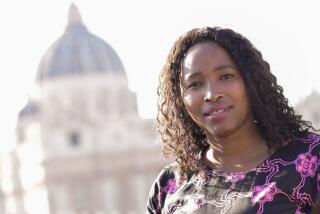Religious Right Dispatches Its Missionaries to Beijing : Women: Making foray onto world stage, Christian groups cite ‘radical’ feminist agenda at U.N. conference.
- Share via
Marking a major turning point in its political activism on the issues of abortion, homosexuality and family values, America’s religious right has marched onto the international stage by taking its fight to the U.N. Fourth World Conference on Women in Beijing.
Major radio ministries like James C. Dobson’s Focus on the Family and Beverly LaHaye’s Concerned Women for America have dispatched delegations to China to challenge what they charge is the conference’s “anti-family” agenda.
The conference opened Monday with 4,750 official delegates from 181 countries. An unofficial but affiliated conference opened earlier north of Beijing, drawing 23,000 representatives of non-governmental organizations.
Until now, the Roman Catholic Church and some Muslim countries have provided the main opposition to proposed declarations at such international conferences, questioning what they see as moral failings in attempts to expand the availability of contraception and abortion.
Last year, for example, Vatican diplomats acting on orders from Pope John Paul II contested efforts at the International Conference on Population and Development in Cairo to make contraception and abortion more accessible to women. The Vatican signed the Cairo population agreement, but it “reserved out” of large parts of the reproductive health section.
Protestants aligned with the religious right’s anti-abortion agenda, however, stayed away from Cairo.
“I thank God that Pope John Paul really blocked some of those objectives in Cairo,” Dobson said. “Evangelicals slept through the whole thing.”
Not anymore. Evangelical Protestants have joined the Vatican and leading Islamic clerics in sounding alarms over the Beijing agenda.
Because the conference’s proposed “Platform for Action” touches so directly on religious issues--such as birth control and abortion--the Beijing conference has become the latest proving ground for the religious right in its drive to establish a unifying moral hegemony in an increasingly diverse and pluralistic world.
The Platform for Action would not be binding on any country. But it would represent an important international consensus on a wide range of women’s issues and serve as a model for developing countries.
It remains to be seen what impact religious conservatives are having in Beijing. They admit they are in the minority.
Practically speaking, the religious right has two immediate aims. First, it wants to keep up pressure on the Republican Party to take a conservative line in next year’s presidential campaign. Second, it opposes any effort to encourage other countries to adopt liberalized abortion policies similar to some in the West.
For weeks, Dobson, LaHaye and others have carried out an intensive campaign on Christian radio stations and in the media assailing the conference as “anti-family.”
Dobson has called the conference “the biggest threat to the family that’s ever occurred in the history of the world” and characterized the proposed Platform for Action as “Satan’s trump card.”
He has urged his listeners to register protests by calling radio talk shows, writing letters to newspaper editors, bringing up the issue in private conversations and writing members of Congress. In China, his four-member delegation to the non-governmental forum in Huairou conducted a workshop for delegates on the importance of a two-parent family.
On Friday, Dobson took to the airwaves on his nationwide radio show to assail First Lady Hillary Rodham Clinton’s speech at the conference in Beijing on Tuesday. Dobson’s office said that while Mrs. Clinton talked in the speech about the importance of motherhood and the family, the Clinton Administration continues to support a draft document that undermines the family.
“There is nothing in the conference document that reflects her rhetoric,” Dobson associate Caia Mockaitis said in Colorado Springs, Colo. “This document is really hostile to marriage, to motherhood and the family. We feel that the First Lady is trying to put a pretty face on a radical agenda.”
LaHaye told her listeners before the conference opened that the word family is mentioned nowhere in the document except to refer to the abuse of women and children.
LaHaye’s delegation to the non-governmental forum took along anti-abortion and other conservative literature in a move to influence the thinking of other delegates, particularly those from developing countries.
In appealing for donations from her 750,000 listeners to finance the five-member delegation’s trip to China, LaHaye warned of the conference’s “radical feminist agenda.”
One elderly couple was so moved by her alarm, she said, they attached a note to their check saying they were buying fewer groceries and watering their lawn less to scrape together a donation.
“That really touches my heart,” LaHaye said.
It also touched a nerve in Washington.
Madeleine Albright, the U.S. ambassador to the United Nations, complained Monday while en route to Beijing that conservatives in the United States were distorting the conference’s purposes.
A day earlier, Mrs. Clinton, the honorary head of the U.S. delegation, wrote in a newspaper column that she was saddened that “a small but vocal band of critics [is] trying to spread the notion that the U.N. gathering is really the work of radicals and atheists bent on destroying our families.”
And the United States’ official government delegation to Beijing has mounted its own public relations campaign against charges from the religious right that the Platform for Action follows a radical feminist agenda and is anti-family.
“It drives me slightly crazy when I hear people going off on a rampage about the silliness that they think that is in this U.N. document,” said Geraldine Ferraro, ambassador to the U.N. Human Rights Commission and vice chair of the U.S. delegation to Beijing.
Far from being anti-family, she and others said, the draft document seeks to strengthen families by advocating equal education for women and girls, condemning violence against women and the “feminization of poverty” and demanding adequate health care for all of women’s needs, not just issues of birth control and abortion.
One of the most prominent charges made by leaders of the religious right is the claim that the draft document redefines the term gender to mean not only male and female but “homosexual, lesbian and trans-gender.”
Defenders of the action plan say those complaints are drawn not from the document itself but from exchanges that took place among conference delegates during preliminary discussions in New York.
Indeed, Dobson and others cite as their source not the U.N. draft itself but a paper by conservative writer and lecturer Dale O’Leary titled “Gender: The Deconstruction of Women.” In it, O’Leary reports on wide-ranging discussions at preparatory meetings in which participants offered ideas as to what the final U.N. document should say.
O’Leary concluded that the “gender feminists” seek to blame religion as a major cause of the oppression of women and that the use of the term gender really denotes “a hidden/unacceptable agenda” that includes “tolerance of non-heterosexual identities and orientation.”
Liberal people of faith disagree, among them Belle Miller McMaster, who heads the National Council of Churches delegation. She is also a professor at the Candler School of Theology at Emory University in Atlanta.
“The word gender means what it has always meant in U.N. documents”--males and females, McMaster said.
But Timothy Wirth, the U.S. undersecretary of state for global affairs and a member of the official U.S. delegation, added that the term gender is intended to convey an idea that goes beyond one’s sex. “Sex is biological. Gender is in fact the expectation of what one’s sex means.” Thus, he said, while a woman may not be physically or biologically limited, gender roles can impose inequalities such as inferior education and health care and limits on property rights.
Girls are 40 times less likely than boys to be hospitalized in some developing countries, according to the State Department. Of 130 million children worldwide who don’t go to school, two-thirds are girls. Nearly two-thirds of illiterate people in the world are women, according to the State Department.
Wirth and others claim that the religious right wants to turn back the clock by reopening debate on issues like abortion and birth control--issues considered resolved at last year’s population conference in Cairo.
Most delegations in Cairo agreed that abortion should be safe and accessible in countries where it is legal but that abortion should not be used in place of contraception.
But few expect that any agreements or compromises reached in Beijing will bridge the religious and ideological chasm that separates Catholic and Protestant conservatives from their moderate and liberal brethren.
Nor is the religious right expected to temper its rhetoric as the 1996 presidential election draws near.
“The conversations are friendly--and not productive,” said McMaster of the liberal National Council of Churches. “They are not prepared to change their view, and we’re not prepared to accept their view.”
* HARMONIOUS GATHERING: Expected war of words fails to materialize at conference. A18
More to Read
Sign up for Essential California
The most important California stories and recommendations in your inbox every morning.
You may occasionally receive promotional content from the Los Angeles Times.













